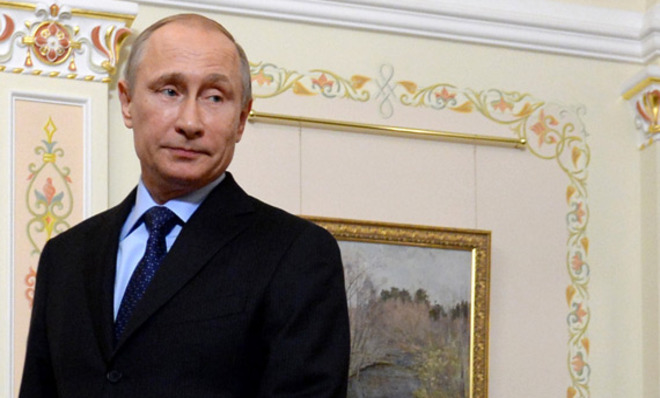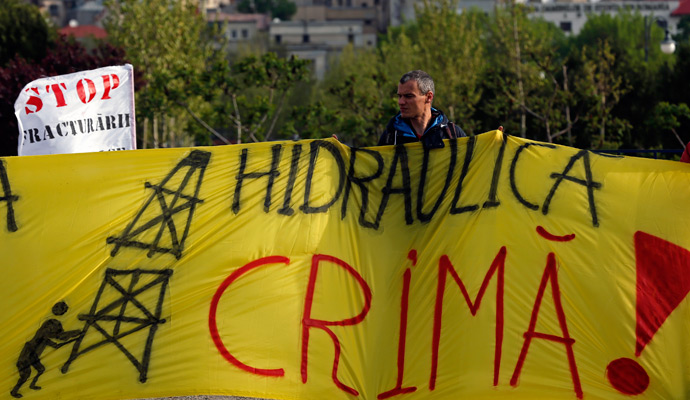Russia's quiet war against European fracking
Environmentalists trying to block shale gas exploration across Europe are unknowingly helping Putin maintain his energy leverage over the continent

A free daily email with the biggest news stories of the day – and the best features from TheWeek.com
You are now subscribed
Your newsletter sign-up was successful

Russia is trying to maintain its energy stranglehold over Europe by backing movements across the continent to demonize fracking, the head of NATO alleged. It is part of Russia's broader use of soft power and covert means to complement its more overt efforts to reassert influence in Europe and keep countries there from developing alternatives to an energy addiction worth $100 million a day to Moscow.
"I have met allies who can report that Russia, as part of their sophisticated information and disinformation operations, engage actively with so-called non-government organizations — environmental organizations working against shale gas — obviously to maintain European dependence on imported Russian gas," NATO chief Anders Fogh Rasmussen said after a Chatham House speech.
NATO officials said Rasmussen's remarks were meant to underscore NATO's growing unease with Europe's energy security situation. "Clearly, it is in the interest of all NATO allies to be able to have adequate energy supplies. We share a concern by some allies that Russia could try to obstruct possible projects on shale gas exploration in Europe in order to maintain Europe's reliance on Russian gas," a NATO official told Foreign Policy.
The Week
Escape your echo chamber. Get the facts behind the news, plus analysis from multiple perspectives.

Sign up for The Week's Free Newsletters
From our morning news briefing to a weekly Good News Newsletter, get the best of The Week delivered directly to your inbox.
From our morning news briefing to a weekly Good News Newsletter, get the best of The Week delivered directly to your inbox.
Hydraulic fracturing, or fracking, has unleashed an energy boom in the United States. But the practice, which is designed to tap previously unreachable stores of natural gas by injecting a chemical cocktail at high pressure to break apart shale formations deep underground, also generates plenty of environmental opposition. Critics say fracking can poison underground stores of drinking water.
In Europe, that opposition is particularly fierce, both because environmental groups have more political power than in the United States and because higher population densities magnify the possible damaging effects of the drilling practice. Some countries have banned fracking outright; others, including France and Germany, have imposed onerous regulations that effectively make the practice illegal, though they are reconsidering fracking in light of the standoff with Russia over Ukraine.
Russian energy firms and officials, as well as Kremlin-controlled media, have lambasted fracking on environmental grounds for years. Top Gazprom officials and even Russian President Vladimir Putin have attacked the technology, which, if adopted, could ease Europe's dependence on Russian gas.
But one thing has for years puzzled energy experts: Well-organized and well-funded environmental opposition to fracking in Europe sprang up suddenly in countries such as Bulgaria and Ukraine, which had shown little prior concern for the environment but which are heavily dependent on Russia for energy supplies. Similar movements have also targeted Europe's plans to build pipelines that would offer an alternative to reliance on Moscow.
A free daily email with the biggest news stories of the day – and the best features from TheWeek.com
"It's very concrete; it relates to both opposition to shale and also trying to block any alternative pipelines with environmental challenges," said Brenda Shaffer, an energy expert at Georgetown University. "There is a lot of evidence here; countries like Bulgaria, Romania, Ukraine being at the vanguard of the environmental movement is enough for it to be conspicuous," she said.

Bulgaria's anti-shale movement is particularly telling. The country initially embraced fracking as a way to develop its own energy resources and reduce reliance on Russia, even signing an exploration deal with Chevron in 2011. But then came an eruption of seemingly grassroots environmental protests and a televised blitz against fracking. In early 2012, the government reversed course and banned the practice.
Researchers who've worked on the ground in Central and Eastern Europe say there is plenty of anecdotal evidence, if no smoking guns, of Russian financial support for some environmental groups that have recently mobilized opposition to shale gas development.
In Ukraine, for example, anti-fracking movements became more organized and better funded just as the government worked to finalize shale gas deals with Western energy firms, officials there say. In Lithuania, "exactly the same thing is happening," said a government official, who described the mushrooming of anti-shale billboards and websites there as "an integrated, strategic communications campaign." As in Bulgaria, the well-funded groups organized screenings of Gasland to galvanize opposition to fracking.
"All of a sudden, in societies that never did grassroots organization very well, you saw all these NGOs well-funded, popping up, and causing well-organized protests," said Mihaela Carstei, an energy and environment analyst at the Atlantic Council.
To be sure, much of Europe's anti-fracking movement is motivated by genuine environmental concerns, just as in the United States; much of that opposition was catalyzed by the controversial 2010 anti-shale documentary Gasland. There are fears about fracking's effect on groundwater and the link between fracking and increased seismic activity. France, for instance, banned fracking before Bulgaria. And despite the Ukraine crisis and the rumblings of pro-fracking sentiment from some senior government officials, which could open the door to France rethinking the ban, fracking is still off the table there for now. Environmental groups such as Greenpeace scoff at the NATO chief's allegations, saying that they oppose fracking for sound environmental reasons. What's more, there's little love lost between Greenpeace and Russia, because Moscow detained dozens of the group's green activists last year.
"I wouldn't underestimate the role that Russia plays in shale gas in Europe, but I wouldn't overestimate it, either," said Andreas Goldthau, an energy expert at Harvard University's Belfer Center who has extensively researched shale gas policies in Europe. "Overall, particularly in Bulgaria and Romania, the causes of shale's problems are varied; it's not only the Russians coming in and trying to start protests."
Ultimately, Russia's efforts to derail Europe's alternative pipeline projects, more than its possible support for anti-fracking groups, represent a more immediate threat to Europe's efforts to diversify its energy supplies, Shaffer said.
"These rival projects are even more of a threat than fracking because shale gas will take a long time to develop, but these projects will soon bring gas to Europe; they are practical and concrete," she said.
More from Foreign Policy...
-
 How the FCC’s ‘equal time’ rule works
How the FCC’s ‘equal time’ rule worksIn the Spotlight The law is at the heart of the Colbert-CBS conflict
-
 What is the endgame in the DHS shutdown?
What is the endgame in the DHS shutdown?Today’s Big Question Democrats want to rein in ICE’s immigration crackdown
-
 ‘Poor time management isn’t just an inconvenience’
‘Poor time management isn’t just an inconvenience’Instant Opinion Opinion, comment and editorials of the day